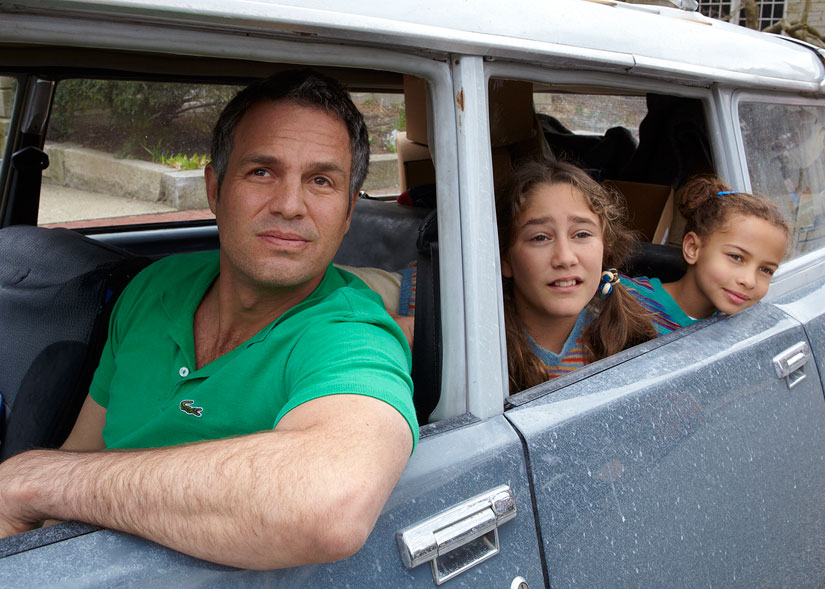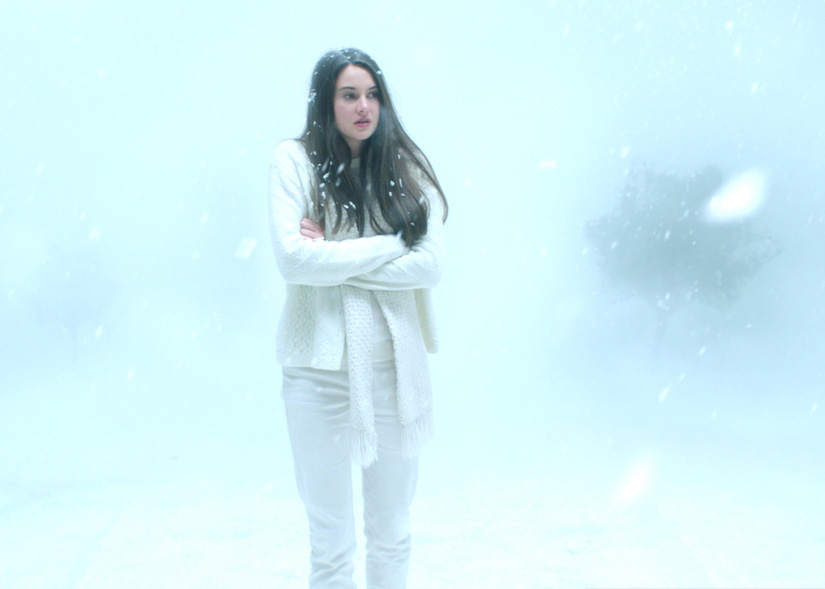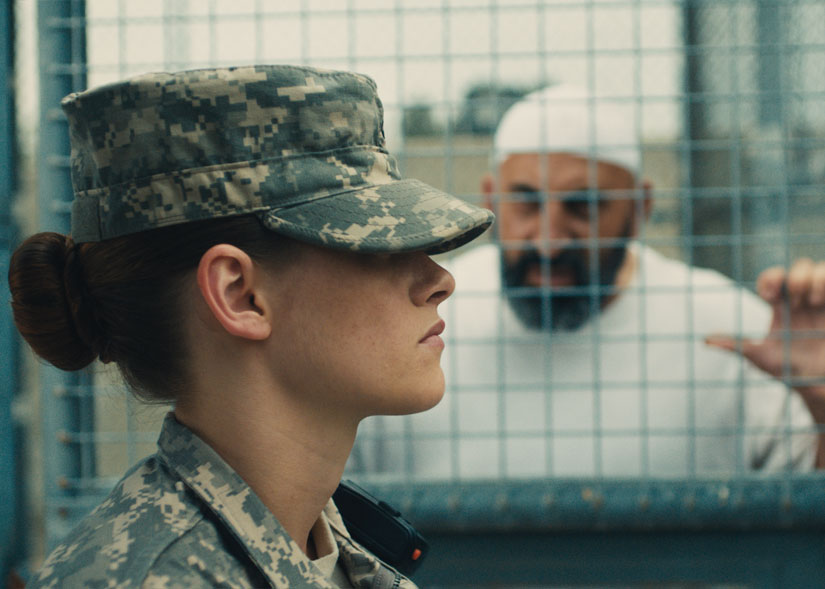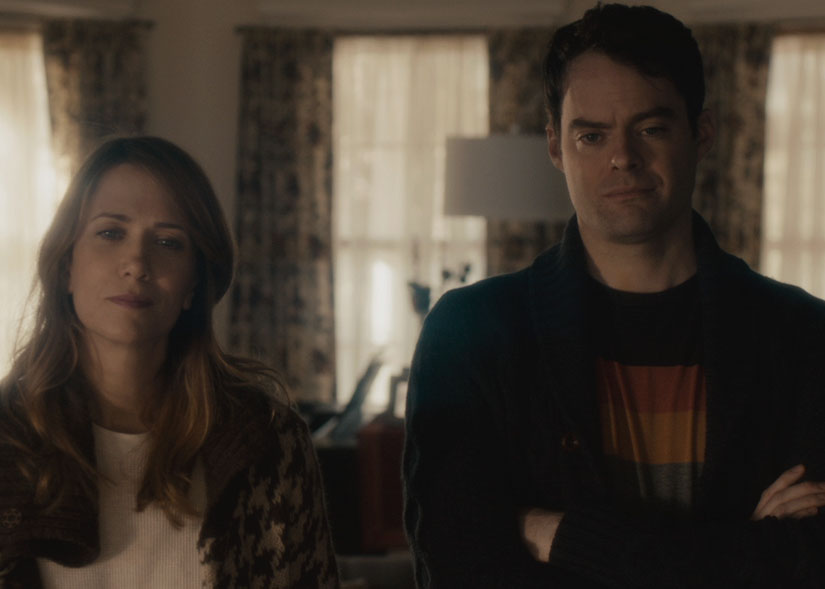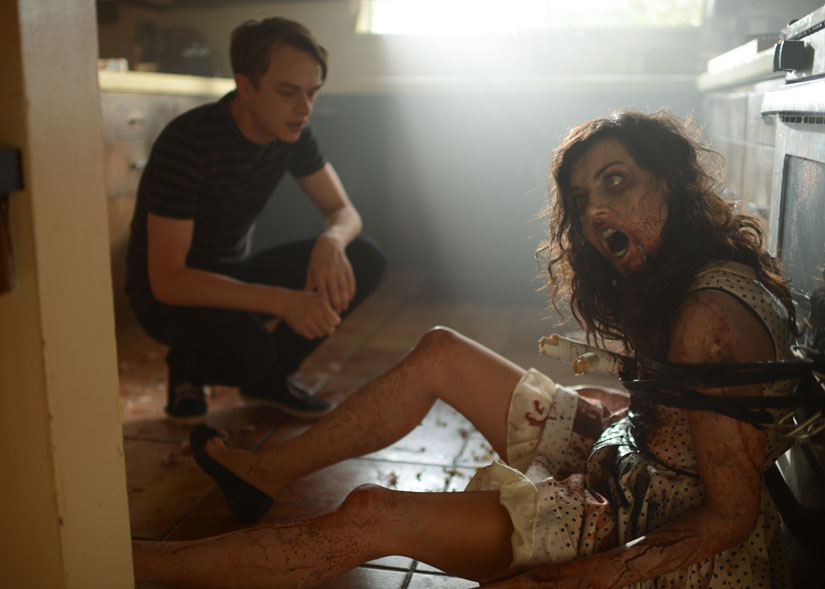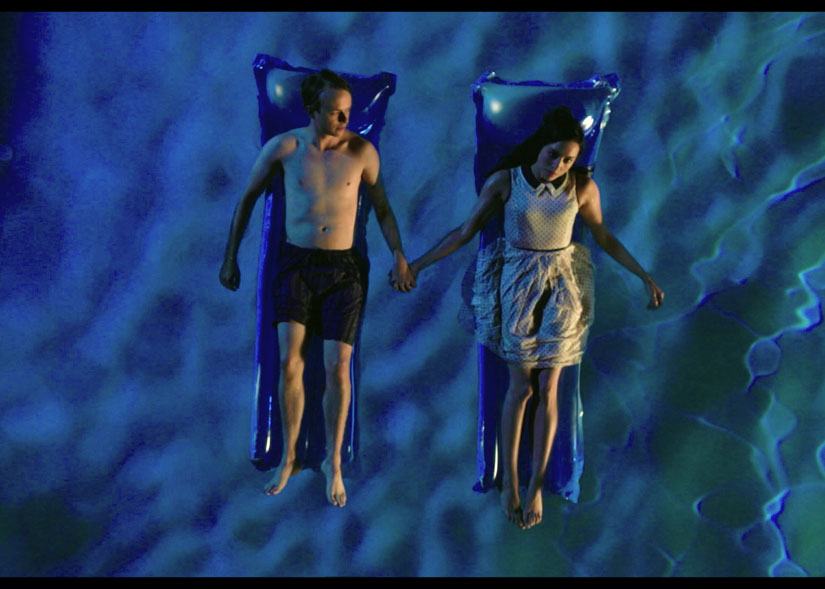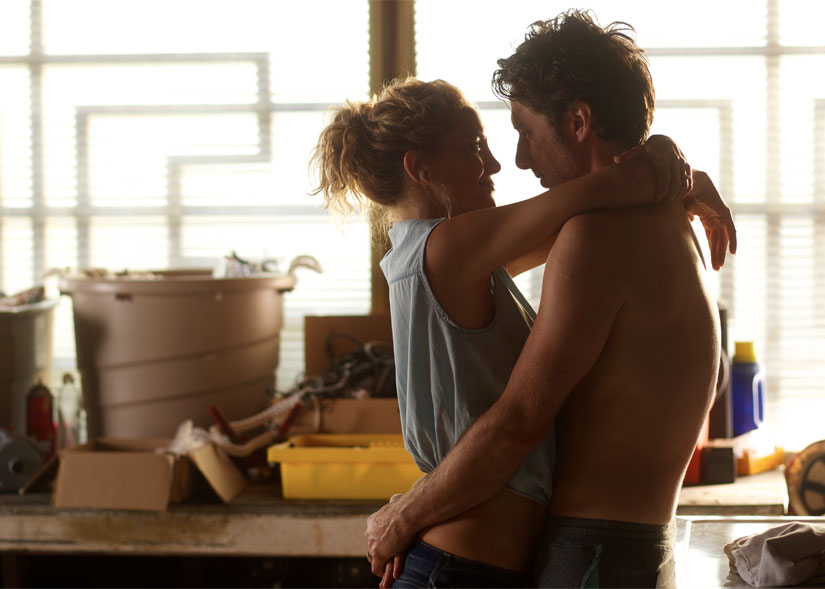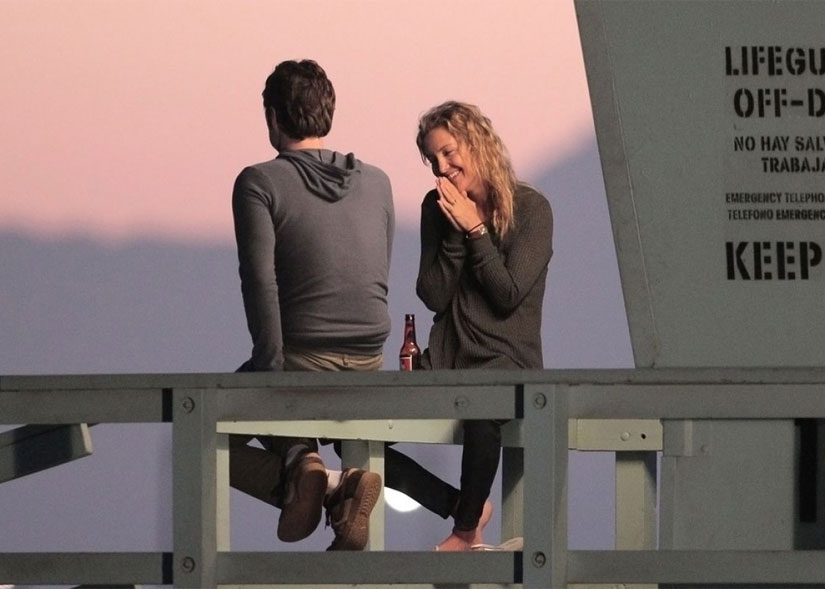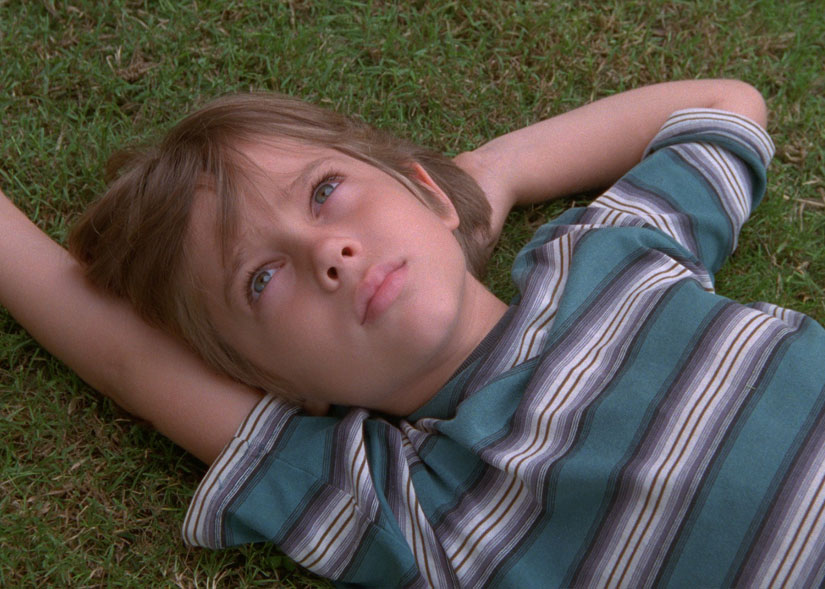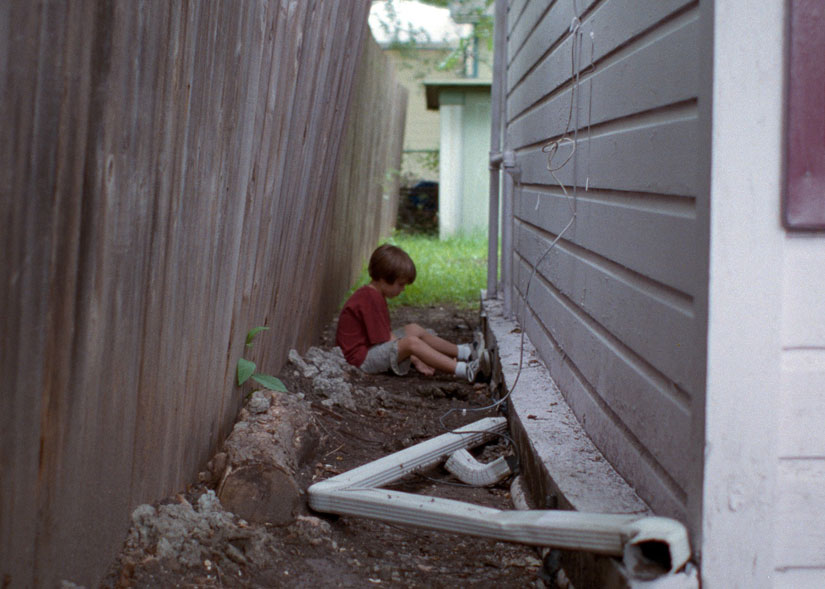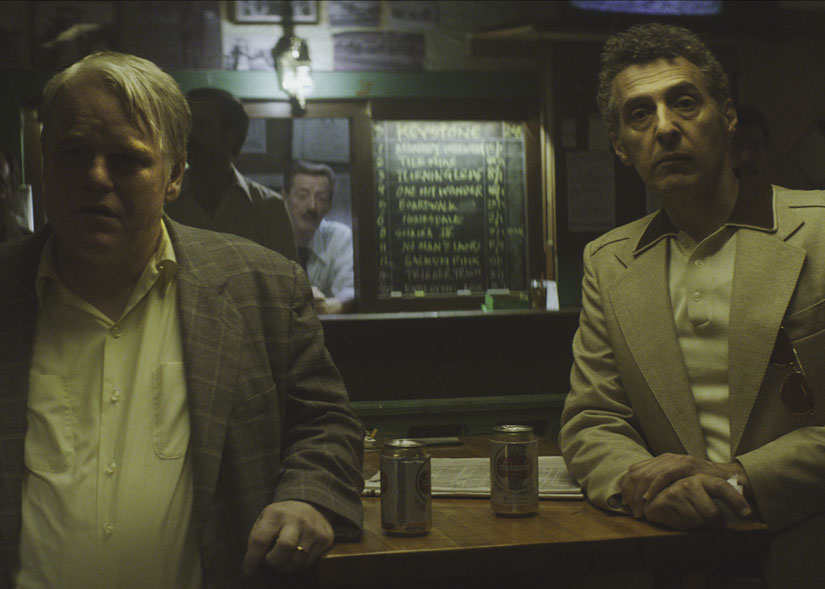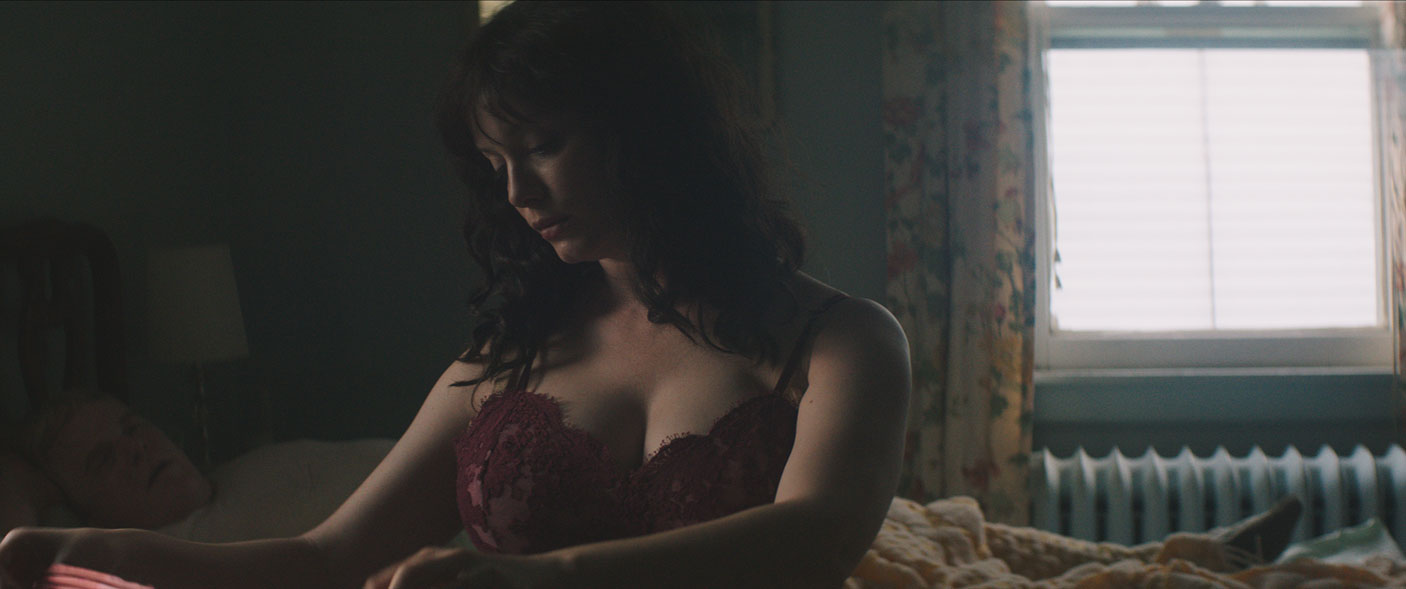[Review] Infinitely Polar Bear
[This review was originally published during our Sundance 2014 coverage. It's being re-posted to coincide with the film's limited theatrical release.]
Infinitely Polar Bear
Director: Maya Forbes
Rating: N/A
Release Date: January 18, 2014 (Sundance), June 19, 2015 (limited)
Infinitely Polar Bear is based on writer/director Maya Forbes' childhood, so it's hard to say what I have to say about the film without an internal pang of guilt surrounded my honesty. To be critical of a film is hard when the film is a representation of a person's real life, and while I've been able to deal with the separation more often than not in the past, I find myself torn as I write this. Consider this paragraph my cold opening for a film that, despite its every attempt to warm my heart, left me feeling chilly.
Cam Stuart (Mark Ruffalo) is a manic depressive father of two who's estranged from his wife, Maggie (Zoe Saldana). After a severe breakdown hospitalizes Cam, Maggie and their daughters Amelia (Imogene Wolodarsky) and Faith (Ashley Aufderheide) are forced to move from their idyllic country home to the city due to Cam's bills. As his health gradually recovers, Maggie finds herself in a growing financial rut. Her best bet is to leave Boston to attain her Master's Degree in New York, entrusting the care of the girls to Cam. What transpires is a test of emotional and psychological strength as Cam and the girls attempt to build and maintain a healthy family dynamic.
Infinitely Polar Bear is a feel-good film, but is sometimes too much at times. Cam's manic depression is treated more as weird tics and character quirks than a real affliction. Is this due to artistic license? Perhaps this is how Forbes saw her own father? We all cope and deal with problems differently, and this could simply be a case of that, but the film downplays Cam's affliction as a cute eccentricity.
Despite that, Ruffalo's performance in Infinitely Polar Bear is probably my favorite of his in recent years. He plays Cam loose, and it fits into the context of the film. Other reviews I've seen elsewhere have characterized his Cam as a manic pixie guy (alluding to the "manic pixie girl" archetype that has arisen in films over the past decade), and I can't argue that. Again, it fits into the film well, but when the crux of the film involves this man's manic depression and how it affects the relationships he has with his family, you'd expect more depth and emotional toil than what's depicted.
[Review] White Bird in a Blizzard
This review was originally published as part of our Sundance Film Festival coverage. It is being re-posted to coincide with the film's theatrical release.
[youtube id="NMU1Hq3pQjM"]
White Bird in a Blizzard
Director: Gregg Araki
Rating: N/A
Release Date: January 20, 2014 (Sundance)
With a name like White Bird in a Blizzard, I couldn't help but find myself intrigued by the film. It didn't hurt that indie darling Shailene Woodley (The Spectacular Now) starred in the film, either. There's a simple connection drawn from the title to the film's premise, yet director Gregg Araki never lets White Bird in a Blizzard ever grow stale. Rather, what starts off tonally as a pseudo-romantic coming-of-age film quickly becomes a dark mystery thriller that had me pinned to the edge of my seat.
Set in the late 1980s, White Bird in a Blizzard is about Kat Connor's (Woodley) relationship with her alcoholic mother, Eve (Eva Green), and cowardly father, Brock (Christopher Meloni). As Kat matured into a young adult, her mother's intense jealousy grew as the distaste of her relationship and life began to take over her psyche in a scary midlife crisis. When Eve mysteriously vanishes, both Kat and Brock face an uncertain future. As the years pass, the disappearance is nothing more than a curiosity until Kat returns home during a holiday college break when new information arises that could complicate her relationships with everyone around her.
It's a bit hard to summarize White Bird in a Blizzard because of all of the plot twists and turns. As I implied in the introductory paragraph, White Bird in a Blizzard carries a certain connotation with it, yet the film is anything but straightforward. This is complemented by Woodley's performance, which is vastly different than anything she's done before. Araki is known for his use of sex and nudity (re: Mysterious Skin), and White Bird in a Blizzard is no difference. Woodley spends just as much time topless as she does clothed, and it came completely unexpected. However, it's all within tasteful reasons that actually serve the plot. Much like the aforementioned Mysterious Skin, there's a creepy, unassured tone underlying the entirety of the film that will keep you second-guessing everything and everyone, tempered by a foreboding notion that something bad is going to happen, and soon.
This sensation is perhaps most characterized by Green's stellar performance. You can't help but both sympathize with her and her unfortunate sense of marital and livelihood stagnation, yet you're frightened and creeped out by her episodic attacks on Kat. Meloni, too, demonstrates his range by playing the assuming Brock, running counter to the rest of his filmography. Hell, even Shiloh Fernandez (Evil Dead) puts in a solid performance as Kat's dimwitted ex-boyfriend.
White Bird in a Blizzard will keep you moving in your seat, whether it's due to arousal or discomfort... which is perhaps the best way to describe a Gregg Araki film. It may be hard to find an audience due to the sexual nature of the film, but if you get the chance to see it at another festival or an independent theater, I highly recommend checking it out.
[Review] Camp X-Ray
This review was originally published as part of our Sundance Film Festival 2014 coverage. It is being re-posted to coincide with the film's limited release.
Camp X-Ray
Director: Peter Sattler
Rating: N/A
Release Date: January 17, 2014 (Sundance)
Guantanamo Bay still serves as a dark footnote in American history more than a decade after its establishment. Everything about the detention camp, from its mistreatment of its "detainees" to the very reason for its existence, is inhumane and utterly sickening. Camp X-Ray is about one specific camp, the titular Camp X-Ray, which served as a temporary detention center in the Guantanamo Bay. Writer/director Peter Sattler's film attempts to humanize both guard and detainee alike.
Amy Cole (Kristen Stewart) is a recently-assigned rookie guard at Guantanamo Bay. While she's cordial and friendly with the other guards, it's with a Gitmo detainee, Ali (Peyman Moaadi), who Cole makes a real connection with. The relationship starts on a frosty tip, Cole the newcomer and Ali the years-long detainee. The dynamic of their friendship, as is made evident early on, revolves around this dichotomy between the two where their individual situations are more common than meets the eye.
Unfortunately, Camp X-Ray is bogged down by stereotypes, ranging from the power-hungry superior officer to the young, naive solder who inevitably falls in line. In a way, the shallow characterization of the supporting cast helps accentuate the focus on both Cole and Ali and their friendship. However, the emotional crux of the film relies on Stewart's performance, which oftentimes showed the potential and range she displayed in Into the Wild, yet is unable to tap into here. When it comes time for Cole to move past her hardened soldier demeanor and show true human emotion, Stewart falters. Whether it was Sattler's direction to keep Stewart reined in to maintain the aforementioned toughness, or simply Stewart's inability to let go, it was hard to look past this one low scene in a film otherwise full of high praise for the actress.
Camp X-Ray doesn't attempt to make much of a political statement, nor does it attempt to excuse the accusations of inhumane treatment that took place at Guantanamo Bay. What it does do, however, is explore a poignant, unlikely friendship between captor and captured, guard and detainee. Sattler, at times, holds audiences hands as he pontificates the similarities between Cole and Ali, which can be frustrating. However, strong performances by Moaadi and Stewart (the aforementioned scene notwithstanding) are enough to overlook the otherwise easy storytelling.
[Review] The Skeleton Twins
This review was originally published as part of our Sundance Film Festival 2014 coverage. It is being re-posted to coincide with the film's limited theatrical release.
The Skeleton Twins
Director: Craig Johnson
Rating: N/A
Release Date: January 18, 2014 (Sundance); September 12, 2014 (limited)
No matter how close we may be with another person, the likelihood of drifting apart is much higher than simply maintaining the relationship. It's a bitter pill to swallow, but various factors weigh in that can either extend or deter a friendship. What's worse is when family members inevitably drift apart. Craig Johnson's The Skeleton Twins tells the story of two twins who reunite after a 10 year-long estrangement - of course, their reunion brings with it both love and heartache as the duo rediscover and rekindle the bond between them.
Following a failed suicide attempt, Milo (Bill Hader) moves from LA to New York to live with his twin sister, Maggie (Kristen Wiig) and her husband, (Luke Wilson). While the reunion is tepid at best, the twins slowly begin to warm up to one another much in the same way their relationship had been as young children. However, as their love for one another grows stronger, so too do the dark secrets they each hide, ultimately coming to a head and changing their respective lives forever.
Given the fact that the leads are SNL alumni (with a supporting cast of Wilson and Modern Family's Ty Burrell), it's easy to assume that The Skeleton Twins will be indicative of the work both Hader and Wiig are most known for. However, while the film has its fair share of genuine laughs, it's a dark film with large skeletons in the closet (no pun intended) finding their way out. The laughs won't overshadow the melodrama, which should be kept in consideration when watching the film. The drama is compelling, twisted, and is honestly more memorable than the jokes.
In saying that, it was great to see Wiig and Hader not only embrace their comedy, but also showcase their range. The Skeleton Twins can get heavy, but it's never pandering or too imposing to the audience. Can it be melodramatic? At times, sure, but Wiig and Hader handle it deftly. The Skeleton Twins may not necessarily represent the actors' abandonment of comedy for drama, but it certainly shows they're more than capable of handling more trying roles.
[Review] Life After Beth
[This review originally appeared as part of our Sundance Film Festival 2014 coverage. It is being re-posted to coincide with the film's theatrical release.]
Life After Beth
Director: Jeff Baena
Rating: N/A
Release Date: January 19, 2014 (Sundance)
Saying goodbye to a loved one is never easy, especially if the circumstances are tragic. However, given a second chance at life, anybody would accept the situation, right? In Life After Beth, writer/director Jeff Baena uses a zombie uprising as the premise behind is romantic comedy about Zach (Kill Your Darling's Dane DeHaan) and Beth (The To Do List's Aubrey Plaza) as a young couple torn apart following the latter's unfortunate passing. Will a promise to make things better the second time be enough to overlook the elephant in the room concerning Beth's return?
After bonding with his ex-girlfriend's father, Murray (John C. Reilly), Zach slowly begins his journey to recovery. For reasons never explicitly explained, Beth seemingly returns from the dead. With a new lease on love, Zach does everything in his power to ensure the relationship goes smoothly. However, as more time after Beth's return passes, she begins to act out, coinciding with the emergence of more dead people.
Simply put, Life After Beth is an allegory for moving on after the end of a relationship. Again, while it's never explained why Beth's (and the rest of the dearly departed's) return is feasible, I think there's an underlying connection to his "connection" to her. In a minor subplot (which, in retrospect, is perhaps the most important of plot turns), an old friend of Zach's, Erica (Anna Kendrick), appears. As they catch up, Beth's condition worsens as she flips between being Zach dependent (relationship-wise) and Zach dependent ("zombie eat brains"-wise). It's interesting subtext, but unfortunately, not enough to hold the rest of the film up.
DeHaan is one of the most talented up and coming actors of this generation, yet his talents are never fully realized in Life After Beth. The film could have been the perfect breeding ground to illustrate his comedy (as he's mostly known for his dramatic roles), but it never comes to fruition. In contrast, Plaza fits well into the film's mold, easily playing both girlfriend and zombie with her patented deadpan, slacker-esque tone. The entirety of the film, however, is low on laughs. Oftentimes, it grasps for low hanging fruit or easy jokes that just aren't all that funny.
[Review] Wish I Was Here
[To commemorate the limited theatrical release of Wish I Was Here, we are re-posting this review of the film from this year's Sundance Film Festival]
Wish I Was Here
Director: Zach Braff
Rating: N/A
Release Date: January 18, 2014 (Sundance)
Almost exactly 10 years after Zach Braff's surprise directorial debut won over both Sundance audiences and general film audiences, his sophomore feature, Wish I Was Here, premiered amidst a wave of excitement and controversy. Last year, the actor/director opened a Kickstarter campaign to fund Wish I Was Here and was met with backlash due to the decision and perceived notion that a "millionaire" shouldn't ask for public funding. Nevertheless, the pre-production of Wish I Was Here is but a footnote and not the focus of the film nor this review.
What does matter is this: 10 years after Garden State surprised audiences and critics alike, was Braff able to strike lightning with his sophomore effort, or was all of the good will that resulted from Largeman and Sam's whirlwind romance the pinnacle of Braff's writing and directing abilities? Read on and find out.
Aidan (Braff) and Sarah (Kate Hudson) are a couple living in LA with two kids, Tucker (Pierce Gagnon) and Grace (Joey King). Sarah supports the family while Aidan struggles to find work as an actor. His father, Gabe (Mandy Patinkin), also provides financial support, as well as pays tuition for the kids' enrollment in a Jewish school. However, when his cancer relapses and he gambles his money on a New Age treatment, Aidan is forced to homeschool the kids while juggling auditions. As Gabe's health begins to regress, Aidan's attempts to reunite his brother, Noah (Josh Gad), with their father go refuted.
Wish I Was Here has echoes of Garden State, especially with Aidan's fleeting success as an actor. While the previous film was a romance about discovering one's identity, Wish I Was Here is about family bonds. 10 years is a long time, and Braff's maturation as a director and storyteller show in the film. There are still a few distinct cues that Braff still follows (the most obvious being the music direction), which is welcome and familiar. However, some of the more ambitious touches in the film should have been cut. For instance, Aidan's noted as a daydreamer, illustrated by mixed live-action/CG scenes in which he imagines himself as a space explorer. These scenes are unwelcome distractions and detract from the story. The subplot involving Noah and his own self-discovery also feels rushed and not as fleshed-out as it could have been.
Wish I Was Here illustrates Braff's growth as an artist, and any fears of a sophomore slump were quickly dismayed. In saying that, the film feels very "safe." It doesn't outshine Garden State, but it isn't held back by it, either. There's definitely a sense of progression found in Wish I Was Here, both in Braff's writing and directing, and I wouldn't mind seeing him tackle both focuses head-on.
[Review] Boyhood
[To commemorate the limited theatrical release of Boyhood, we are re-posting this review of the film from this year's Sundance Film Festival]
Boyhood
Director: Richard Linklater
Rating: N/A
Release Date: January 19, 2014 (Sundance)
Richard Linklater is known for his style of filmmaking that focuses on the mundane. Conflict and narrative don't mean much to the writer/director, his preoccupations with film revolving more around the naturalistic approach to capturing real life and humanity. He's explored and experimented with cinematic techniques throughout his career, with the rotoscoping found in Waking Life and A Scanner Darkly to the long takes found in the Before trilogy being the most indicative of his interests.
However, Linklater raised the bar with his latest film, Boyhood. Shot over a 12 year period, the film is a linear exploration of a young boy's growth into an adult from the ages of 6 to 18 and the growing relationship he has with his father. It's epic in scope and, under the guidance of another director, might have bombed out early in production. Linklater's latest cinematic experiment blurs the lines between reality and fiction, narrative and documentary, and does so in a way that is never once intimidating or loses sight of its goal.
Boyhood follows the life of Mason (Ellar Coltrane) who, at the beginning of the film, is a six year old facing a sudden move with his mother (Patricia Arquette) and sister (Lorelei Linklater). Not long after arrival, the kids' estranged father (Ethan Hawke) re-enters their lives, promising to spend more time with them. The film then proceeds to track the next 12 years of Mason's life as he faces typical adolescent conflict such as girls, bullies, peer pressure, etc., to darker moments like his mother's abusive husbands. Each year is noted by little cues pinpointing which year the scene takes place in, mostly noted by audio cues of that year's popular songs.
Boyhood could be seen as a 12-year-long scripted reality show, not unlike the plethora of garbage infiltrating TV right now. However, the film is so much more than that. As Mason grows older, you can see how his younger self already had a sense of self-identity, and watching it manifest itself over the film's 164 minutes (yes, it's a long ride) is a gift. Linklater might have had an inkling of a narrative idea upon Boyhood's early beginning, but kept it flexible to adapt to Coltrane's life and how it progressed. In a way, there's a blurring of lines between when Coltrane began playing Mason and when Mason and Coltrane became one in the same.
What separates Boyhood from documentaries is that, despite the film's scope and approach, it's still very much a fictional narrative. The film represents a natural cinematic experience that's never once caught up by its artificial conflicts. I can't even begin to fathom the editing process Linklater and crew had to go through to boil down 12 years' worth of footage into a seamless feature; 164 minutes may sound like too much, but I personally didn't feel it one bit. What I did feel, however, was Linklater's patented focus on existential pontification is represented not only in Mason, but in the film's interesting approach; moreover, Boyhood retains a sense of nostalgia for the past decade, becoming itself a time capsule of '00s Americana.
Boyhood may not resonate with everybody, but it will certainly leave a lasting impression on every single person that watches the film. Linklater's ability to not only capture so much and have the ability to adapt every physical and emotional change within Mason/Coltrane into a cohesive fictional narrative is an achievement in and of itself. The film will be talked about for a long time, at first due to its interesting approach, but will hopefully be remembered by the sum of its parts.
[Review] God's Pocket
[This review was originally published as part of our SXSW 2014 coverage. It is being re-posted to coincide with God's Pocket's theatrical release.]
God's Pocket
Director: John Slattery
Rating: N/A
Release Date: January 17, 2014 (Sundance)
Dark comedies sometimes appear to be the easiest genre to work in. They can be gruesome, violent, brutal, unforgiving, eye-opening, over-the-top, exaggerated, complete satires of a film that, for better or worse, get a bit of a pass due to its branding. Is this lazy? Perhaps. When done right, we get films like Pulp Fiction and Reservoir Dogs. Mishandled, however, and the result is like the endless amount of straight-to-DVD films that have followed in Vincent and Jules' wake.
With his feature length directorial debut, John Slattery (Mad Men's Roger Sterling) delivers God's Pocket, a neighborhood-driven film in which an assortment of pratfalls present conflicts to the characters in precarious manners. Which side of the "dark comedy" spectrum does God's Pocket fall on? Read on and find out.
Mickey (Philip Seymour Hoffman) is a God's Pocket transplant, a small neighborhood in Philadelphia where the natives stay native generation to generation. He runs small-time jobs with his friend (John Turturro) for a mob-esque figure, his wife, Jeannie (Christina Hendricks), doesn't care much for him, and his step-son, Leon (Caleb Landry Jones), is a racist pig. When an altercation at Leon's job leaves him dead, Jeannie's Motherly intuition suspects something is amiss. While Mickey turns to his mob friends for help, a famed local reporter (and heavy alcoholic), Richard Shelburn (Richard Jenkins) takes it upon himself to discover the truth... and much more.
The focus of the film isn't so much on Leon's death, but on the various characters residing in God's Pocket. Everybody from the funeral director (Eddie Marsan) to the local barkeep portray not characters, but caricatures that play into the overall plot... for better or worse. The problem is that, outside of Hoffman and Turturro, every character is a gimmick, an empty shell lacking real personality or character. The tone of the film shifts between a dark comedy and a psuedo-noir genre, but isn't able to find its identity. It's unfortunate, too, because Hoffman's performance in God's Pocket is great in spite of the uneven writing.


